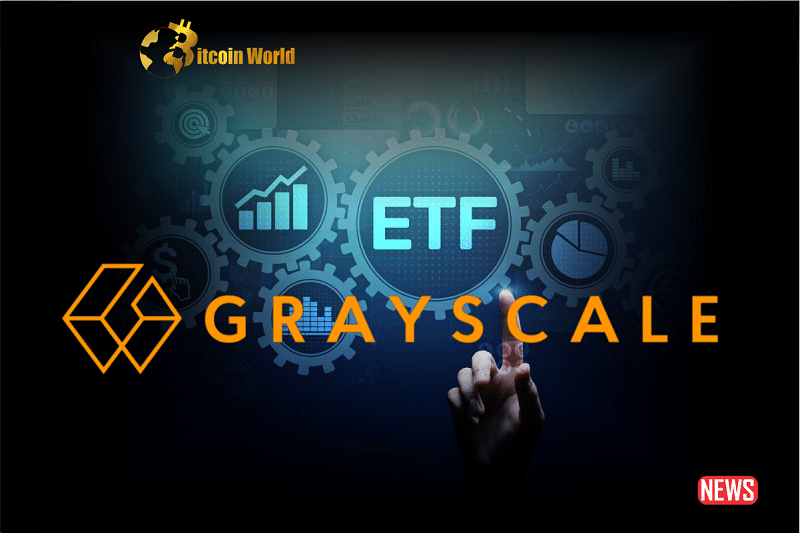The world of crypto investments just got a whole lot more interesting! Grayscale Investments, a major player in digital asset management, isn’t backing down from its mission to broaden access to the crypto market. Despite an ongoing legal tussle with the SEC, Grayscale has just announced the creation of the Grayscale Funds Trust, a new division designed to manage its publicly traded financial products internally. And that’s not all – they’ve also thrown their hat in the ring with the US Securities and Exchange Commission (SEC) for the approval of not one, not two, but three new exchange-traded funds (ETFs). Let’s dive into what this means for you and the future of crypto investing.
What Exciting New ETFs Has Grayscale Proposed?
Grayscale’s latest filing with the SEC includes a trio of innovative ETFs, each offering a unique way to tap into the crypto ecosystem:
- Ethereum Futures ETF: Think of this as a way to potentially profit from the future price movements of Ethereum without directly holding the cryptocurrency. This ETF would invest in futures contracts that track the price of ETH.
- Global Bitcoin Composite ETF: This ETF aims to provide exposure to the broader Bitcoin ecosystem. Instead of just holding Bitcoin, it would invest in companies involved with Bitcoin, such as Bitcoin mining operations.
- Privacy ETF: This one’s particularly intriguing. It would focus on businesses developing blockchain-based privacy technologies. In an increasingly data-conscious world, this ETF offers a way to invest in the future of secure and private digital interactions.
Why Now? Grayscale’s Bold Move Amidst Regulatory Hurdles
Grayscale’s announcement comes at a pivotal moment. You might remember their ongoing battle with the SEC to convert their massive $17 billion Grayscale Bitcoin Trust (GBTC) into a spot Bitcoin ETF. The SEC has consistently rejected applications for spot Bitcoin ETFs, citing concerns about potential fraud and market manipulation. Frustrated by this stance, Grayscale filed a lawsuit, arguing that the SEC’s approval of Bitcoin Futures ETFs while rejecting spot Bitcoin ETFs is inconsistent and lacks proper justification.
Grayscale’s argument centers on the high correlation between spot and futures Bitcoin markets. According to their complaint, these markets are nearly inseparable, with a correlation of 99.9%. This begs the question:
If Futures ETFs Are Okay, Why Not Spot Bitcoin ETFs?
This is the core of Grayscale’s legal challenge. The SEC has approved several Bitcoin Futures ETFs, which, as the name suggests, invest in futures contracts rather than directly holding Bitcoin. The SEC’s hesitations around spot Bitcoin ETFs generally revolve around:
- Market Manipulation Concerns: The SEC worries about the potential for manipulation in the underlying spot market for Bitcoin.
- Investor Protection: The regulatory body wants to ensure that investors are adequately protected from potential risks associated with these relatively new asset classes.
- Lack of Surveillance-Sharing Agreements: The SEC has sought surveillance-sharing agreements with significant, regulated markets for spot Bitcoin trading, which have been challenging to establish.
Despite these concerns, the approval of Bitcoin Futures ETFs has led many to believe that a spot Bitcoin ETF is inevitable. Grayscale’s continued push, even with the legal battle underway, underscores their confidence in the future of spot Bitcoin ETFs and their commitment to providing diverse crypto investment options.
What Are the Potential Benefits of These New ETFs?
If approved, these new ETFs could offer several advantages for investors:
- Diversification: The Global Bitcoin Composite ETF allows investors to gain exposure to the Bitcoin ecosystem beyond just holding the cryptocurrency itself.
- Accessibility: ETFs are generally easier for traditional investors to access through their existing brokerage accounts, compared to directly purchasing and storing cryptocurrencies.
- Regulation and Security: ETFs are regulated investment vehicles, potentially offering a greater sense of security and oversight compared to direct crypto ownership.
- Exposure to Emerging Trends: The Privacy ETF offers a way to invest in a potentially high-growth sector focused on blockchain privacy solutions.
What Are the Challenges and What’s Next?
Of course, there are challenges ahead. The SEC’s stance on spot Bitcoin ETFs suggests that approval for these new offerings won’t be a walk in the park. Here are some key considerations:
- SEC Approval: The biggest hurdle is securing the SEC’s green light. The timeline for this is uncertain, and there’s no guarantee of approval.
- Market Volatility: Crypto markets are known for their volatility. Investors need to be prepared for potential price swings.
- Understanding the Underlying Assets: It’s crucial for investors to understand the nuances of futures contracts and the businesses involved in Bitcoin mining and privacy technology before investing.
Key Takeaway: Patience is Key
While the announcement of these new ETFs is exciting, it’s important to remember that they are not yet available to the public. Grayscale needs the SEC to approve the registration statement for the Grayscale Funds Trust before these products can be offered for sale.
In Conclusion: A Glimpse into the Future of Crypto Investing
Grayscale’s latest move signals a strong belief in the continued growth and evolution of the cryptocurrency market. The proposed Ethereum Futures ETF, Global Bitcoin Composite ETF, and Privacy ETF offer intriguing possibilities for investors looking to diversify their crypto exposure. While the regulatory landscape remains a significant factor, Grayscale’s determination to innovate and expand access to digital assets is undeniable. Keep an eye on this space – the outcome of Grayscale’s filings and legal battle could significantly shape the future of crypto investing.
Disclaimer: The information provided is not trading advice, Bitcoinworld.co.in holds no liability for any investments made based on the information provided on this page. We strongly recommend independent research and/or consultation with a qualified professional before making any investment decisions.




